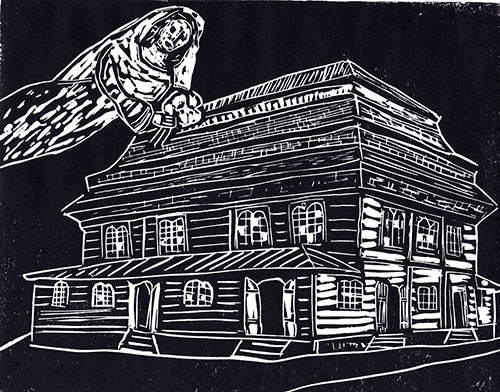Lost Treasures: The Wooden Synagogues of Eastern Europe The Artwork of Bill Farran
Jedwabne, Poland - Original Linocut
Jedwabne, Poland - Original Linocut
Yiddish name: Yedvavna
Jedwabne is a small town in the Bialystok region of Poland. The Polish nobleman who owned the town, invited Jews to settle there. By the 18th Century Jedwabne received rights to hold local fairs on Sunday and five country fairs a year. Their large wooden synagogue was built in 1770.
On July 10, 1941, while the German SS stood by, Mayor Marian Karolak led a group of Polish men from Jedwabne to round up the Jews, forcing them into the town square. After being brutalized and beaten, many were killed. Later that day most of the remaining 300 Jews were led to a barn, locked inside, and burned alive. This pogrom was carried out by the Polish citizens of Jedwabne.
Knowledge of the massacre only became widespread in 1999–2003 due to the work of Polish filmmakers, journalists, and academics, in particular Jan Gross's 2001 work “Neighbors: The Destruction of the Jewish Community in Jedwabne, Poland”. Public interest in the incident prompted a forensic murder investigation in 2000–2003 by Poland's Institute of National Remembrance, which confirmed that the direct perpetrators were ethnic Poles. The country was shocked by the findings, which challenged common narratives about the Holocaust in Poland that focused on Polish suffering and heroism, and that non-Jewish Poles had little responsibility for the fate of Poland's Jews.
Purchase a print
Original linocut prints are 8x10 inches, and are available either unmatted or in an 11x14 matte.
I also offer matted 5x7 digital prints. These prints are created from high-res digital images and come in an 8x10 matte.
